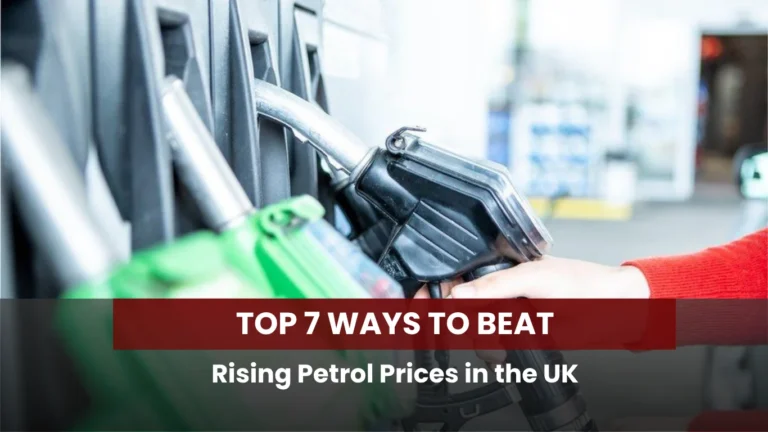When the Pump Becomes the Pain
With the spectre of rising petrol prices in the UK looming large, what once felt like a routine cost is now a real-world dent in the monthly budget. It’s not just unreliable. According to the RAC Foundation and the UK government’s own statistics, the average price of unleaded petrol for a week in October 2025 is hovering around 135.19 pence per litre.
Drivers are understandably feeling the pressure: more of their hard-earned money is going into fuel, leaving less for other household priorities. The good news is that while you can’t control global oil markets, you can control how you respond. If you are wondering how to save on petrol UK or want UK fuel saving tips, this blog is built for you. Here are seven practical, meaningful ways to reduce fuel costs UK, become savvy about the cheapest petrol near me UK, and ultimately take more control of your motoring budget.
1. Plan Your Journeys
One of the simplest but often overlooked ways to reduce your fuel costs in the UK is to be intentional about your journeys. Think of your car not as an always-ready machine but as a tool with a cost. Every journey has to justify itself.
Tips for execution:
- Make a weekly “trip bundle” list: errands, shopping, school runs, social visits. Just group them by area and day.
- Avoid unnecessary detours: think twice before “just popping” somewhere.
- Use navigation apps that show real-time traffic and allow you to avoid congestion.
- If you live in a city and have access to public transport, cycling or walking for shorter journeys can be a massive help.
By doing this, you’ll find yourself spending less time at the pump because your car simply travels less for the same functionality. That’s a cornerstone of cutting fuel consumption in practice.
2. Drive Efficiently to Save Fuel
Once you’ve reduced the number of journeys, the next target is how you drive. Good driving habits dramatically affect how much fuel your car uses. Yes, part of the blog’s focus is on drive efficiently to save fuel, and here’s how to do it.
Key behaviours to adopt:
- Smooth acceleration and deceleration: Avoid “jack-hammer” starts and abrupt stops. Accelerating gently and coasting (when safe) to reduce speed gradually uses less fuel.
- Maintain a steady speed: On open roads or motorway driving, use cruise control if you can safely. A constant speed is more efficient than constant changes.
- Avoid excessive idling: If you’re stationary for more than 30 seconds. switch off the engine where allowed. Idling burns fuel for nothing.
- Use the highest gear possible: For manual cars, shifting up early (without lugging the engine) helps. For automatics, ease off the accelerator when up to speed.
- Monitor tyre pressures and engine health: Under-inflated tyres and poorly tuned engines increase fuel consumption.
3. Shop Around for the Cheapest Petrol Near Me UK

Even if your driving habits are optimal, one variable you can control immediately is where you fill up. Finding the cheapest petrol near me UK is a hugely effective way to beat rising fuel costs
- Use apps, websites and fuel-price trackers to check nearby petrol stations.
- Consider filling up just outside busy or high-priced areas
- Time your fill-ups: sometimes early morning or mid-week might bring slightly lower prices as stations adjust.
- Keep an eye on promotions as some supermarkets or partner fuel cards offer small discounts or loyalty points.
This practice helps you stay ahead of the rising petrol prices UK narrative by finding the best value for each litre you buy. Over the years, those savings compound.
4. Maintain Your Vehicle to Maximise Fuel Efficiency
Fuel efficiency isn’t just about how you drive but also about how well your vehicle is maintained. An efficient car uses less fuel for the same journey. If you ignore maintenance, you’ll be paying more to save less.
What to look after:
- Regular servicing: A clean air filter, spark plug check for petrol cars, fuel system check, all keep the engine running at optimal efficiency.
- Tyre condition & pressure: Even at correct pressure, worn tyres increase drag and fuel consumption.
- Weight and load: Remove unnecessary weight from the car, when roof racks when not needed, heavy unused items in the boot.
- Proper engine temperature and proper oil: Engines need to reach optimal temperature for best efficiency; making sure the oil grade or type is correct helps too.
- Alignment and aerodynamics: If your car pulls to one side or you drive with open windows at high speed rather than using the vent smart, your fuel use may go up.
If maintained properly, you’ll be squeezing more miles out of each litre, thereby helping mitigate the impact of rising petrol prices UK and doing your bit to reduce fuel costs UK.
5. Right Fuel Station, Time & Frequency
It is also important to consider timing and frequency in addition to the question of which station. The more often you stop, the more overhead you incur. There are smarter ways to fill up.
Proven Methods to include:
- Fill up just before long trips: Avoid having to start the trip with a near-empty tank, which may make your engine work harder initially.
- Avoid topping up half tanks if you can go longer: Frequent small fills may seem convenient, but often mean you’re pumping while your fuel gauge is higher and you may miss the opportunity to take advantage of a lower price.
- Coordinate fill-ups with when you’re already out: Avoid making a special trip purely to fill up unless the price benefit is clear.
- Be mindful of peak-price times: While there’s no perfect time, some stations adjust prices during busy periods or when deliveries happen. A small amount of price monitoring helps.
By being strategic about how often and when you fill up, you’re controlling more of the variables involved in how to save on petrol UK even when external price pressures are mounting.
6. Switch to an Electric Vehicle
Sometimes the most powerful way to reduce fuel costs in the UK is to revisit the vehicle you use. If you’re still driving an older, lower-efficiency petrol car, the cost of rising petrol prices in the UK will hit you harder than someone in a more efficient model and even more so compared with an electric vehicle. Get your mind when you are switching:
- The upfront cost vs long-term savings: A more efficient petrol/diesel car or hybrid may lower fuel consumption, but an EV takes it further.
- Charging infrastructure: If you have off-street parking and access to home charging, EVs shine. If not, it’s still worth comparing.
- Total cost of ownership: Consider fuel/charging costs, maintenance, tax, insurance, and depreciation.
- Future-proofing: With increasing pressure on fossil-fuel vehicles and possible regulatory changes, a fuel-efficient car or EV may help you avoid higher running costs later.
7. Smart Fuel Habits & Track Your Consumption
If you truly want to stay ahead of rising petrol prices in the UK, start by understanding your own driving patterns. Tracking how much fuel you use, how often you refuel, and how your habits affect consumption can reveal eye-opening insights. This personal awareness is one of the most effective UK fuel-saving tips.
How it helps:
- Identify waste: By tracking your mileage and average fuel use, you can pinpoint when your car’s efficiency drops, where often a sign of maintenance issues or inefficient driving.
- Spot trends: A steady rise in fuel use might indicate under-inflated tyres, extra load, or more stop-start trips.
- Stay accountable: Recording each fill-up encourages mindful driving. You’ll automatically start thinking, Can I make this litre go further?
- Use apps and digital tools: Try fuel-tracking apps that log every refill, calculate your cost per mile, and even show the cheapest petrol near me UK options.
- Set personal goals: Challenge yourself to improve your miles per litre each month and turn it into a mini-game to drive efficiently to save fuel.
FAQ
Rising petrol prices UK refers to the broader trend of pump prices moving upward over time. For example, the mid-month average retail price of petrol for March 2025 was 137.6 pence per litre, with diesel at 144.9 pence. While these may be slightly down from the peak in 2022, they remain high historically and volatile.
Savings vary based on your driving habits, vehicle and local fuel price. But by switching to efficient driving habits, using cheaper stations and monitoring prices, many drivers can save hundreds of pounds per year. If you switch to an EV, savings are even greater as of now.
This phrase means locating the station nearby offering the lowest pump price in your area. Use price-comparison apps/websites, look in less-obvious locations (not motorway service stations), and fill up when you see a good price rather than just for convenience.
Yes. Driving inefficiently or running a poorly maintained car can raise fuel consumption. Conversely, smooth driving, correct tyre pressure, and good maintenance help maximise each litre is essential when you want to reduce fuel costs UK.
Think both short- and long-term. In short term, use the strategies above to manage immediate costs: drive smart, shop around, and maintain your car. In the long term, consider upgrading to a more efficient vehicle or EV, evaluate your overall transport needs and keep monitoring price patterns. Fuel prices fluctuate, but building good habits and positioning yourself early will pay off.
Want more tips on how to save on petrol in the UK? Keep exploring expert advice and real-world hacks at Ask About Cars.







